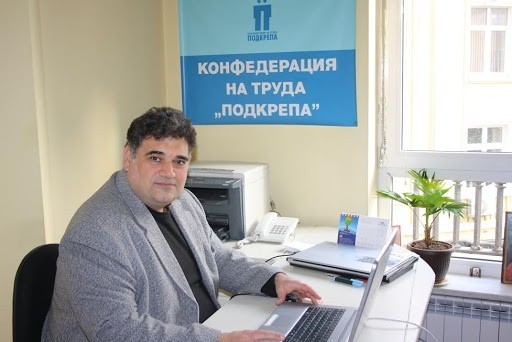As the Covid-19 pandemic was raging economic experts and analysts warned that the world was facing the deepest economic crisis, comparable to the great depression of the 1930s. According to European Commission forecasts development in many countries will decline considerably, with the effects on the world economy expected to be far worse than after the financial crisis of a decade ago. As to Bulgaria, the expectations are of a 7.2% decline in the economy this year, with the unemployment rate surging up to 7%.
“Things in this country are a little bit different than in the other European countries like Spain, Italy, France, even Luxembourg is in bad shape,” says Alexander Zagorov, confederal secretary of the Pokrepa Confederation of Labour. “If we are to compare economies – their enterprises are the engine of Europe, ours are in the periphery. We make the parts, they put the car together. Fortunately, we have wonderful conditions that can be made us of, like climate, farming opportunities, forestry. Unfortunately, we export workers whom we are unable to retain, to work in the agriculture and forestry of other countries of Europe.”
 The economic consequences of the crisis are not going to be felt right away, as in the other European countries, but in 3-4 months’ time, Zagorov says. In his words, workers, employers and administrative departments are not psychologically prepared to work in crisis. “The governments of the European countries with big economies were not prepared, nor were the managers of big enterprises. What they tried to do was rescue the money of the shareholders and all of a sudden it turned out they were creating a threat to their own businesses. This example is not to be underestimated.” In this country economic recovery is not going to be based on political decisions and on doling out money. The solution lies in those niches in which Bulgaria could have some kind of economic advantage.
The economic consequences of the crisis are not going to be felt right away, as in the other European countries, but in 3-4 months’ time, Zagorov says. In his words, workers, employers and administrative departments are not psychologically prepared to work in crisis. “The governments of the European countries with big economies were not prepared, nor were the managers of big enterprises. What they tried to do was rescue the money of the shareholders and all of a sudden it turned out they were creating a threat to their own businesses. This example is not to be underestimated.” In this country economic recovery is not going to be based on political decisions and on doling out money. The solution lies in those niches in which Bulgaria could have some kind of economic advantage.
“Agriculture, crop growing and stockbreeding are two of these niches, but to my mind there are no clear indicators, as yet, to what an extent our economy will plunge,” Zagorov says. “That is why no one can say how and when it should be helped to recovery. It is not going to be easy for us.”
As to the policies Europe is beginning to introduce, the expert from Podkrepa Confederation of Labour says we shall face a big dilemma. As a society we shall have to find the right course to take – and choose between restoring the old way in which energy, industry, tax apportionment were developing, or opt for a new way.
“The green deal which was in the focus of public attention before the crisis is connected with the different taxation of environmental instead of economic indicators,” Alexander Zagorov says. “We have many outstanding issues in our society and the recovery of the economy will never happen if we don’t find a consensus. Somebody must have the strength to rally politicians and community leaders around an idea, and propel state and society forward. There is no way common objectives can take our relations of confrontation as a basis, they must look towards our shared interests.”
Kristalina Georgieva, Managing Director of the International Monetary Fund
Spoke in much in the same vein in an interview for the German Handelsblatt. She drew attention to the development of new models of sustainable development. “Also, creating new transfer programs, boosting public work programs, provide financial assistance to help companies sustain employment. Progressive tax measures can also be part of the policy mix,” for coming out of the crisis.
Darina Grigorova
Photo: archive
The two largest trade unions in Bulgaria - the Confederation of Independent Trade Unions in Bulgaria and the Confederation of Trade Unions "Podkrepa" - are organizing a warning protest in front of the Council of Ministers building. It is planned for..
In view of the country's declining population, the Fiscal Council recommends that the government take savings measures in the 2026 state budget. The measures include: reducing the municipal administration by merging municipalities;..
No disruptions or price increases are expected on Bulgaria’s fuel market following the US sanctions imposed on Russian oil companies Rosneft and Lukoil, Bulgarian Petroleum and Gas Association Chairman Svetoslav Benchev told BTA. "For now, I..

+359 2 9336 661
